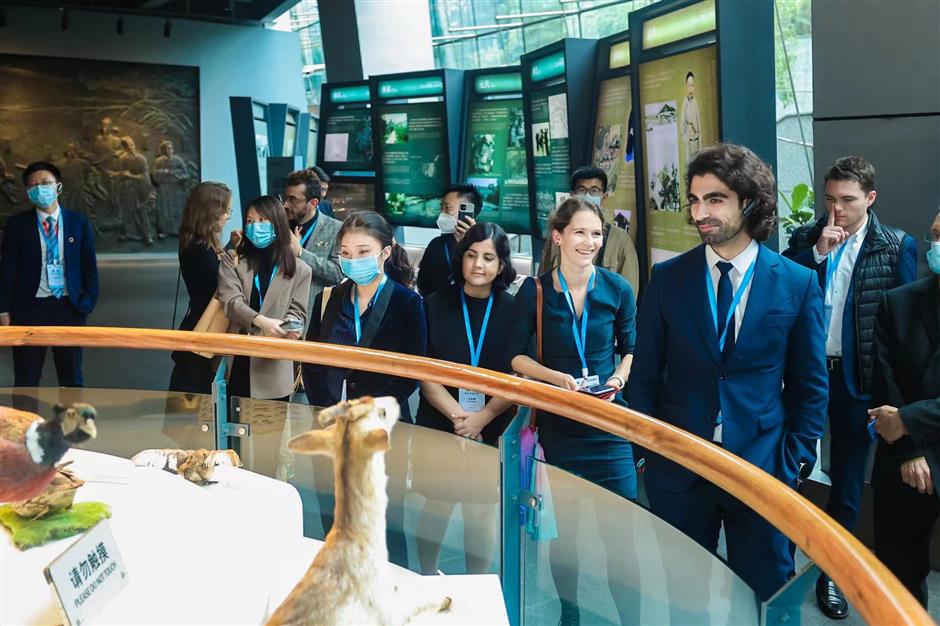Hangzhou hosts conference to attract tech talent
Around 1,000 high-end professionals from home and abroad attended the 2021 Hangzhou International Human Resources Exchange and Cooperation Conference.
The conference attracted more than 160 national top 500 enterprises, organizations and universities. Professionals and overseas returnees have reached cooperation agreements with companies, mainly in the fields of information technology, biomedicine, advanced equipment manufacturing and financial services.

Attendees from national top 500 enterprises, organizations and universities show up at the conference.
Due to the COVID-19 outbreak, the conference also hosted an online portion which offered 187,000 jobs from 315,000 companies. The "online plus offline" mode used cloud and big data technologies in building Hangzhou's talent pool.
"Hangzhou is a center of innovation, entrepreneurship and creativity. In recent years, the city has been attracting talent from all over the world and has introduced a series of policies, such as 27 Terms of the New Talent Policy and 37 Terms of the Talent Environment," said Mayor Liu Xin.
"The net inflow rate of tech talent in Hangzhou has remained the first in China for many years, and it has been selected as the most attractive Chinese city in the eyes of foreign talent for 11 consecutive years."
One of the highlights of the conference was the meeting of the biomedical industry. The organizing committee cooperated with the Hangzhou Institute for Advanced Study, a branch of Chinese Academy of Sciences, to develop promising biomedical projects.
In July, Hangzhou government announced an award of up to 30 million yuan (US$4.6 million) for the development and research of first-class innovative medicines and up to 12 million yuan for the upgrading of such treatments.
The grants and the meeting are in line with the State Council's 14th Five-Year Plan (2021-25) which boosts biopharmaceutical science and targets the building of a group of national biopharmaceutical laboratories across the country.
In recent years, companies with the capacity to develop domestic drugs have been emerging in the city, including the famous Betta Pharmaceuticals and Tigermed. Hangzhou's biomedical and health industries are expected to reach 1 trillion yuan in output by 2030.

Leslie Maasdorp (second from right), chief financial officer of the New Development Bank, shares his insight about talent-driven economic development for common prosperity during the 2021 Hangzhou International Human Resources Exchange and Cooperation Conference.
Another highlight was the China Returnees Forum. First held last year, the forum was themed "The Fire of the Stars, Ran for a Century" this year. It aimed to build a bridge between Chinese overseas students and government, enterprises and academia, helping returnees understand the policies and opportunities in China and calling for more to return to start new businesses.
As a national model to attract returning overseas Chinese entrepreneurs, Hangzhou has offered incentives and capital for years to support returnees to start new businesses in the city. Ding Lieming, founder of Betta Pharmaceuticals, returned in 2002 to build the company with subsidies from Hangzhou government. He has served as an example for Chinese overseas students.
The Entrepreneurship Competition for Returnees is an ideal platform for overseas students to show their innovative talents and seek cooperative opportunities from the local government. This year, projects from nine returnees and three expats stood out among more than 1,340 entries from the United States, Germany and the United Kingdom.
During the previous six competitions, about 180 entrants have set up companies in Hangzhou, with a total registered capital of 1.2 billion yuan. Most were in the new energy, pharmaceutical, information technology and artificial intelligence industries.

Foreign tech professionals are attracted by the conference.
In addition to high-tech talent, the conference has also emphasized vocational skills for years. The 17th Zhengxing Cup China Youth Vocational Skills Competition, part of the conference this year, was hosted in Hangzhou on November 1. Professionals from different fields showed their ingenuity and skills.
Skilled technicians to operate robots are in great demand in the high-tech manufacturing industry in China. Last year, the country faced a shortage of 20 million skilled workers in the advanced manufacturing industry.
Competition is not limited to modern manufacturing. It also included catering, hairstyling, and other service industries. For years, it has evolved into a platform for young workers to develop a higher level of skills and search for more possibilities for their own careers.
Zhejiang Province government has kept developing vocational training and education in recent years and now has 376 vocational schools and more than 2 million students who will become the backbone of the manufacturing and service industries.
















